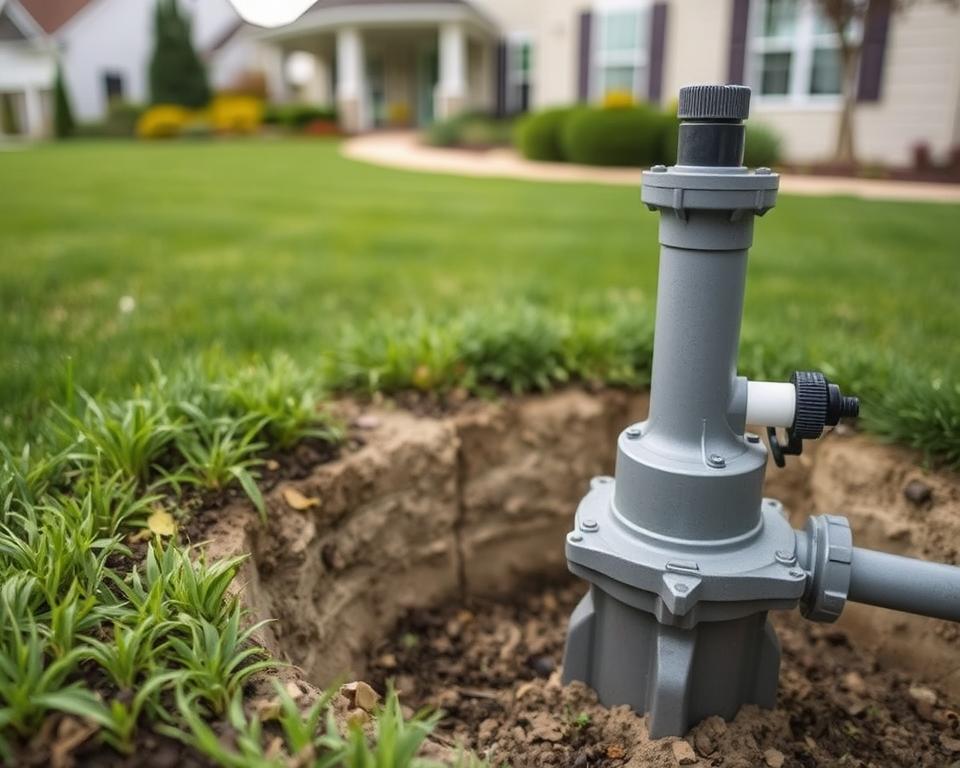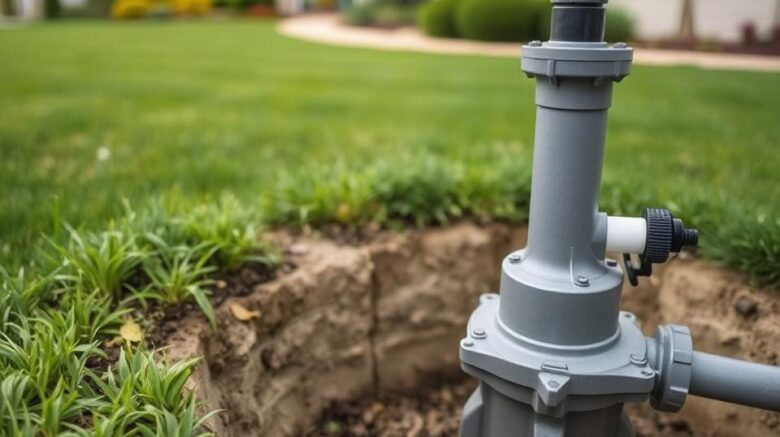Pumping Your Septic System
Ever pondered how often you should arrange septic system pumping so you can dodge hefty breakdowns? With in excess of 20 percent of U.S. households depending on septic systems, understanding their maintenance is crucial. Pinpointing the right time to book a septic tank service is key to its lifespan. Additionally, homeowners have access to affordable septic pumping services that ensure excellent functionality without overspending. We’ll explore crucial upkeep tips helpful for every homeowner.
Key Learnings
- Routine septic system pumping is vital for smooth performance.
- Spotting the symptoms that suggest the necessity for service can prevent major issues.
- Selecting professional septic system pumpers ensures top-quality maintenance.
- Affordable septic pumping options are within reach for homeowners.
- Routine inspections promote maximum system performance.
Know How Your Septic System Works
A septic system serves a vital role in processing household wastewater, made up of several important components that function in unison. The initial drain line carries wastewater from your home to the septic tank, where the process begins. In the tank, an underground chamber, solids accumulate at the bottom, and bacteria break down these solids, treating the waste effectively.
The clarified liquid outflow subsequently moves from the septic tank to the distribution box, where it is spread evenly across the drain field or leach field. Here, the soil carries on with the filtration, continuing to purify the wastewater. Understanding the functions of these septic system parts is essential. It allows homeowners to oversee and maintain their systems effectively.
Knowing how your septic system functions helps you implement preventive maintenance measures. It’s wise to have periodic appointments with licensed technicians of septic systems – septic tank pumping. They provide crucial insights for peak performance of your system. These specialists help in planning the required pump-outs and checks. This diligence can greatly lengthen your septic system’s lifespan.
Importance of Septic System Maintenance
Maintaining your septic tank on a routine basis is pivotal for homeowners who aim for their system to last. A well-cared-for system offers peace of mind and secures your property’s value. Without adequate care, you’re risking system breakdowns and health dangers.
Choosing a first-rate septic pumping service is essential. They offer timely inspections and pump-outs, removing sludge and scum buildup. If maintenance is neglected, emergency pumping may be required, which is costly.
Sticking to a steady maintenance plan is wise. It includes professional evaluations and regular pumping. This preventive measure helps avoid urgent issues, creating a healthier living environment for everyone.

Signs Your Septic System Needs Attention
Staying mindful of septic system issues can prevent costly repairs and major damage. Common signs show when your system needs a check. These comprise:
- Sluggish drains throughout the house
- Pooling water in the yard above the drain field
- Unpleasant odors near the septic tank or leach field
- Exceptionally green grass growth in particular areas of your yard
These symptoms could point to problems that might result in your system failing. Prompt action is critical. Contacting septic pumping professionals for an inspection aids. Prompt response avoids minor issues from turning into major ones. Moreover, routine upkeep secures your system runs well and has a longer life.
Best Practices for Septic System Pumping
Timely pumping of your septic tank is crucial to sidestep hefty clogs and backups. It’s vital to find the ideal schedule for maintenance. Homeowners should typically schedule pumping every 2 to 5 years, depending on the tank’s size and household wastewater levels. Intensive use of garbage disposals may require more frequent pumping.
Employing qualified pumpers guarantees your tank gets a thorough clean and check-up. During pumping, specialists look for any issues, such as faulty baffles. Detecting these problems at an early stage avoids larger expenses and inconveniences later. Regular pumping schedules and expert help provide your septic system’s trouble-free operation.
Regular Inspections Keep Your Septic System Running
Regular inspections are crucial for your septic system’s performance. Septic system inspections uncover small issues before they worsen. Professionals advise inspections every three to five years, depending on system size and household usage. This prevents costly fixes.
Keeping maintenance records is crucial for documenting your system’s condition. These records give insights into previous inspections, repairs, and suitable intervals to schedule septic tank cleaning services. With this information, preparing for future upkeep becomes easier, keeping septic systems in prime shape.
Consistent inspections and detailed record-keeping not only boost system efficiency but also extend its life. This strategy protects the environment and the investment in a safe, operational home.
| Inspection Type | Recommendation Frequency | Benefits |
|---|---|---|
| Visual Inspection | Annually | Identify surface issues |
| Professional Inspection | Every 3–5 years | Assess functionality and detect problems |
| Septic Tank Pumping | Every 3–6 years | Prevent overflow and system failure |
Water-Saving Habits for a Healthier Septic System
Mindful water use is key for keeping your septic system robust. It not only supports the environment but also boosts the performance of your home’s plumbing. By embracing simple, yet effective, conservation methods, homeowners can cut down on wastewater.
Stagger your laundry activities over the week instead of doing them all at once. This allows the septic system to manage water better and avoids tank overflow. Choosing low-flow fixtures in your kitchens and bathrooms yields considerable water savings, maintaining the water pressure up while cutting the flow rate, thus lowering the amount of wastewater produced each day.
Swiftly fixing leaks is another way to help your septic system. Even a small leak can result in a large waste of water, overburdening the septic system. Through periodic inspections and repairs, you greatly aid the system’s efficiency.
Emphasizing water conservation isn’t just beneficial for your septic system; it’s also a step towards sustainable living. Making such practices a part of your lifestyle serves both your household and the planet.
Managing Household Waste Correctly
Homeowners hold a crucial role in maintaining their septic system’s health by disposing of household waste properly. It’s essential to avoid flushing non-biodegradable items like wipes, plastics, and other harmful products in the system. These items can cause clogs, leading to costly repairs and a drop in efficiency.
Composting food scraps and organic materials is a beneficial alternative to sending them to landfill. This practice markedly cuts down on the amount of solid waste entering the septic tank. Emphasizing biodegradable waste disposal supports the ecological balance needed for effective waste management.
It’s essential to keep an eye on what goes down the drains. Non-decomposable items can necessitate more frequent septic tank pumping. By understanding and following correct waste disposal methods, you can secure a more efficient and long-lasting septic system.
Choosing Septic-Friendly Cleaners
The health of your septic system is heavily influenced by your choice of cleaning products. Selecting septic-safe cleaning products is crucial. These products safeguard the balance of beneficial bacteria that break down waste. Many standard cleaners have harmful chemicals that threaten this balance, causing pricey repairs or system failure.
Homeowners should try natural alternatives that are both effective and environmentally friendly. Common household items like baking soda, vinegar, and lemon juice are great choices. These natural cleaners are not only capable but also support your septic system’s health.
Avoiding products that contain antibacterial agents and chlorine bleach is important. Such substances harm the beneficial good bacteria, compromising your system’s functionality. By picking sustainable products, you protect both the efficiency and longevity of your septic system.
Bacterial Health and Your Septic System
Bacteria play a vital role in keeping your septic system efficient. They decompose solids on their own and boost nutrient processing. A lack of healthy bacteria can trigger system failure, creating hefty repairs.
Homeowners can improve their system by adding organic additives. These products boost beneficial bacteria, making waste decomposition more effective. It’s important to select organic additives that are beneficial, not harmful, to the septic environment.
A healthy bacterial community is key to a septic system’s longevity and efficiency. It avoids solid buildup and cuts the need for frequent pumping. Emphasizing bacterial health makes waste management more effective and eco-friendly.
Conclusion
Septic system care is crucial for the life and functionality of your home’s wastewater system. Following key maintenance tips avoids expensive repairs. Knowing routine pumping and inspections is paramount. This guarantees your septic system stays in top condition.
Becoming knowledgeable of your septic system’s operation and best practices in water and waste management is vital. Engaging professionals like All in Sanitation delivers expertise. This contributes to your septic system’s long-term health and gives peace of mind.
Investing in proper septic maintenance today yields future benefits. It protects your home and enhances your family’s quality of life. Emphasizing septic system care gives certainty with a well-maintained system.
